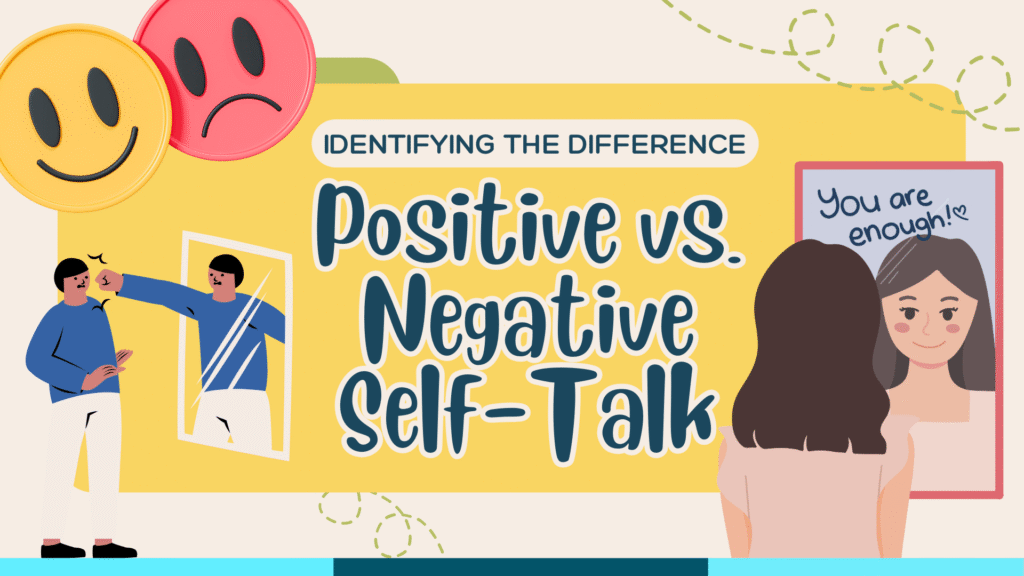“Self-talk is a double-sided knife—it can be your greatest ally or your sharpest enemy.”
We all have an inner voice. It’s the voice that narrates our thoughts, helps us make decisions, and reacts to the world around us. This voice, known as self-talk, isn’t always neutral. Sometimes, it uplifts and motivates us. Other times, it criticizes and tears us down. Understanding the difference between positive and negative self-talk is essential if we want to use this powerful tool for growth rather than harm.  Positive self-talk is the encouraging and supportive internal dialogue that reminds you of your strengths and helps you stay grounded in the face of challenges. It’s the voice that says, “You’ve got this,” when things get tough, or “It’s okay to make mistakes—you’re still learning,” after a setback. It doesn’t pretend everything is perfect, but it allows space for patience, hope, and progress.
Positive self-talk is the encouraging and supportive internal dialogue that reminds you of your strengths and helps you stay grounded in the face of challenges. It’s the voice that says, “You’ve got this,” when things get tough, or “It’s okay to make mistakes—you’re still learning,” after a setback. It doesn’t pretend everything is perfect, but it allows space for patience, hope, and progress.
Negative self-talk, on the other hand, is that cutting edge of the knife that turns small missteps into sweeping judgments. It sounds like, “I’m not good enough,” or “Why even bother trying?” This kind of thinking can quickly spiral, making you feel stuck, helpless, or unworthy. It thrives on perfectionism, fear of failure, and constant comparison to others.  The truth is, we all engage in both kinds of self-talk at different times. What matters most is becoming aware of what kind of dialogue we’re practicing—and how often. Our inner voice is not always right, but it is always influential. If left unchecked, negative self-talk can slowly chip away at our confidence and hold us back from taking chances or believing in ourselves.
The truth is, we all engage in both kinds of self-talk at different times. What matters most is becoming aware of what kind of dialogue we’re practicing—and how often. Our inner voice is not always right, but it is always influential. If left unchecked, negative self-talk can slowly chip away at our confidence and hold us back from taking chances or believing in ourselves.
The good news? Self-talk is not fixed. Like any habit, it can be changed with intention and repetition. The first step is recognizing when your thoughts become overly harsh or self-defeating. Once you notice those patterns, you can challenge them. Ask yourself: “Would I say this to someone I care about?” If not, consider how you could rephrase your thought to be more helpful, realistic, and kind.
Shifting to positive self-talk isn’t about blind optimism or ignoring difficult truths. It’s about creating a space where your thoughts support your well-being instead of working against it. It’s choosing to believe that failure doesn’t define you, that growth takes time, and that you are worthy of compassion—especially from yourself. Self-talk is a double-sided knife. When used with care and awareness, it can carve out strength, clarity, and self-belief. But if wielded without intention, it can cut deeply, leaving behind self-doubt and hesitation. You hold the handle. How you use it is up to you.
Self-talk is a double-sided knife. When used with care and awareness, it can carve out strength, clarity, and self-belief. But if wielded without intention, it can cut deeply, leaving behind self-doubt and hesitation. You hold the handle. How you use it is up to you.
Written By:

Rtr. Amna Naushad
(Junior Blog Team Member 2024-25)
Edited By:

Rtr. Thisara Kuruppuarachchi
(Senior Blog Team Member 2024-25)


